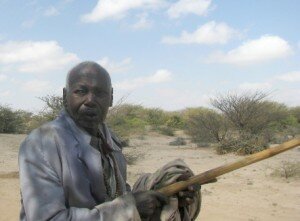SOMALIA: Help for drought-displaced pastoralists
 HARGEISA, 21 June 2010 (IRIN) – With more and more drought-affected pastoralists in the self-declared republic of Somaliland seeking alternative livelihoods in urban areas, aid organizations and the government are instituting measures to not only check the rural-urban migration but also support those remaining in rural areas.
HARGEISA, 21 June 2010 (IRIN) – With more and more drought-affected pastoralists in the self-declared republic of Somaliland seeking alternative livelihoods in urban areas, aid organizations and the government are instituting measures to not only check the rural-urban migration but also support those remaining in rural areas.
“We have started a project supporting the agro-pastoralists of Hargeisa and Awdal [mid-west] regions of Somaliland, targeting about 318,000 people or 53,000 families living in 158 settlements in these regions,†Nadim Khouri, the director of the International Fund for Agricultural Development (IFAD) Programme for the Near East and North Africa, told IRIN.
According to Somaliland’s Ministry of Resettlement, Rehabilitation and Reintegration (MRRR), only 56,671 pastoralist households were drought-displaced in 2005 but that figure has since increased to 92,373 in 2009.
Mohamed Diiriye, the immediate former director in the ministry, told IRIN: “Some of the reasons for the increase in the number of internally displaced persons [IDPs] include the return of at least 300,000 refugees [from neighbouring countries] who had fled their homes in the last two decades, as well as those recently displaced by consecutive years of drought across the country. Moreover, tribal conflict in some areas has led to increased displacement, with many people seeking refuge in the main urban centres in Somaliland.â€
Cluster villages
The IFAD project, part of a long-term programme the agency has been implementing in Somaliland over several years, targets different categories of pastoralists and agro-pastoralists.
Khouri said the targeted households were located in communities consisting of two or three cluster villages and were either pastoralists, who keep livestock such as camels, cattle, sheep and goats, or agro-pastoralists, who practise mixed crop farming and keep livestock.
Beneficiaries of the project and the government have welcomed IFAD’s intervention.
Ali Abdi Odawa, Somaliland’s director-general for agriculture, said: “Somaliland receives about 2,500mm of rain per year, which is a lot compared to other north African Sahara countries, but our problem is that we do not have the capacity to conserve the water; for this reason, we are happy to have such a project, which is a key development needed by our community.â€
According to IFAD, the pastoralists targeted in the project receive improved livestock breeds, such as oxen, sheep and goats, to eventually help increase the weight of their animals and thus fetch better prices in livestock markets.
Also included are infrastructure improvement and the establishment of communal health facilities, and safe water and sanitation systems in the targeted areas.
Challenges
The pastoralists who have migrated to urban areas continue to face challenges of changing lifestyles and living under difficult economic conditions.
Asha Mohamed, in her 60s, moved to Hargeisa, Somaliland’s capital, six months ago. “I came to Hargeisa after all my 100 sheep died due to the drought in Bildhale [north of Hargeisa],†she said on 17 June.
“I now live in Ayaxa 1 [an IDP settlement in south Hargeisa] but I have not received any support; only my neighbours help me out now and then by giving me food. I came here [the headquarters of the MRRR] to get plastic sheeting to cover my hut.â€
Mohamed had earlier learnt that the ministry was to distribute plastic sheeting to IDPs. She said her plan was not to return home but instead seek alternative means to support herself and her family in Hargeisa.
“If I had support, I could sell tomatoes and vegetables but unfortunately, I have no capital,†she said.
Other drought-displaced pastoralists are lucky to get support from relatives once they arrive in the capital. Niman Hassan Dahir, a waiter in a small traditional restaurant in the capital, told IRIN on 16 June: “I came to Hargeisa in 2009 after consecutive years of drought destroyed our livelihood in our home [Gabiley region]; since I started working at this restaurant, I make at least 20,000 Somaliland shillings a day [US$3.70], which is enough to sustain me because I do not pay rent since I live with a relative.â€
__
IRIN
Comments
comments
 Calendar
Calendar






































